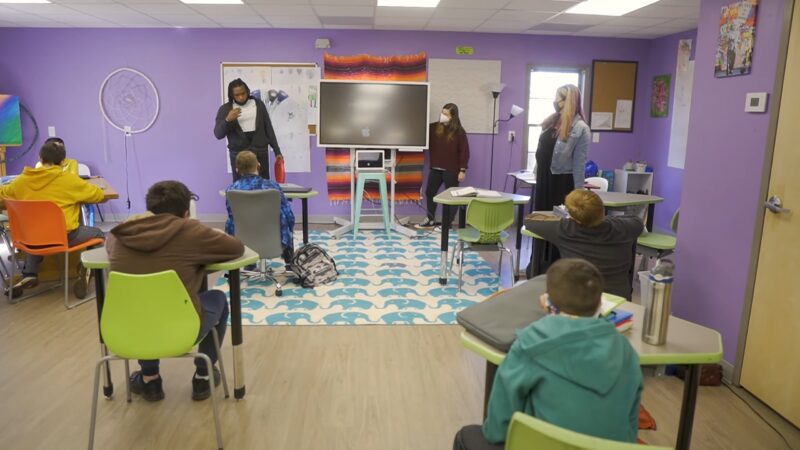Special education teachers help kids with all kinds of learning needs. Their job is super important, but do they get paid enough money for all their hard work? This is a really big question because teachers need cash to live good and feel good about what they do each day.
In America, special education teacher salary can be totally different from area to area. It is a valuable duty to look closer at their paychecks, compare them to other teachers, and think about why some folks may feel pay is too low.
Key Takeaway
- Special ed teachers do important work helping kids learn – Their jobs aren’t easy but are super valuable
- What teachers earn changes based on where they teach and their experience – Teachers in big cities and with more years under their belt tend to make higher pay
- Further education can boost salaries later on – Teachers who keep learning will see their paychecks grow over time too, which is cool
Special Education Teacher Salary – How Much?

Most special ed teachers in the US usually get around $61,097 each year. That’s about $5,091 each month, or $29 per hour. But what they take home can change based on where they teach, how long they’ve been teaching, and how many more schools they went to after getting their first degree.
It can be challenging for Special Education Teachers to find jobs in the US due to a variety of factors such as high competition, limited availability of positions, and specific qualifications required for the role. Additionally, some states may have more demand for Special Education Teachers than others, leading to disparities in job opportunities.
Does Where You Live Affect Your Paycheck?
The city or state you teach in can really change how much you earn. Teachers in big, expensive places like New York or California often make more money than those in states like Mississippi or Arkansas where things cost less. Talent.com says special ed teachers can earn up to $87,748 per year, especially in areas with really high costs of living.
Does Experience and Schooling Change What You Make?
How long you’ve been teaching for and how much more education you have are also super important for your paycheck. Teachers who’ve been at it longer usually earn higher salaries. For example, new teachers may start at $45,000 yearly, while experienced teachers can make over $70,000.
Teachers with advanced degrees or special training can also earn more than those with just a regular four-year degree.
Special education teacher salary is Less than Regular?
Good question when we speak about the topic “Special education teacher salary”. Is pay lower compared to general education teachers? The truth is mixed up. It depends on the school district and state.
In many places, special ed and regular teachers earn about the same with similar experience and education. But some districts may pay special ed teachers extra because their job needs more skills and is tougher to do.
Why Do Some Think Special Ed Pay Is Too Low?
There are a few reasons some folks may feel special ed teachers are paid too little. Their work is very demanding and requires extra effort to help kids with big learning or physical problems. This means more paperwork, meetings, and working with other professionals. Even with the extra tasks, their pay may not show the added responsibilities, leading to the idea of low wages.
How Can Teachers Boost Their Paycheck Over Time?

There are ways for special ed teachers to increase what they earn as the years go by. Continuing their education and getting advanced degrees or special training is one path. Many schools offer higher pay for teachers with master’s degrees or specialized learning.
Teachers can also take on leadership roles in their schools, like becoming department heads, which often brings higher pay. Doing more professional growth and training also helps boost your salary.
Is There Room for More Pay Later On?
Despite challenges, special ed teachers have chances to earn more money as they gain experience. Teachers who pursue higher education and take on extra duties see their salaries rise over time. With growing awareness for special ed, there is potential for better pay structures in the future.
School districts and policymakers are starting to understand how important it is to pay special ed teachers well to keep great professionals in this vital field.
FAQ
What is the average pay for special ed teachers?
The average is around $61,097 each year in the US.
Do teachers earn higher salaries in certain states?
Yes, pay is usually higher in cities and states like New York and California.
Can more schooling lead to more money later on?
Yes, advanced degrees and special training can result in higher salaries as the years go by.
Is their salary less than regular teachers?
It differs, but in many places, their pay is similar to general education teachers with the same experience and education over time.
Is it difficult for a Special Education Teacher to find a job in the US?
It can be challenging for Special Education Teachers to find jobs in the US due to a variety of factors such as high competition, limited availability of positions, and specific qualifications required for the role. For a better chance, find out how to write a good resume.
Summary
To wrap it all up, special ed teachers are essential to education, helping kids with all sorts of needs. But what they earn varies a lot in America based on where they teach, experience, and schooling. While urban and expensive areas tend to pay more, overall it seems special ed teachers may not get paid fairly for their challenging jobs. Many feel their salaries don’t match the high cost of living. Only 42% believe what they earn is enough to afford where they live. This shows teachers who feel their hard work is not rewarded the way it should be. To keep great teachers, there needs to be more recognition and better pay that shows how valuable their work truly is. Addressing these issues is key to making sure special ed teachers feel appreciated for all they do.
I’m Carys Morales, an advocate and analyst dedicated to exploring how politics and education intersect. My interest in US politics has grown to encompass the effects of political decisions on education. I focus on understanding how legislative and policy changes can enhance our educational systems. By analyzing the impact of political dynamics on educational equity and innovation, especially through the outcomes of elections and policymaking, I aim to uncover and discuss the critical role politics plays in educational reform. Through my writing and contributions to various discussions, I advocate for policies that further learning advancements, believing in the power of informed policy to transform education.

